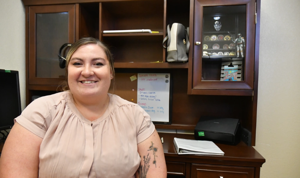
15 Sep Army Fellow program allows participants to gain professional experience
YUMA — Being in the Army Fellow program at Yuma Proving Ground (YPG) for the better part of the past year and a half has allowed Emily Mickel to get an early start in her chosen profession.
Mickel, a mechanical engineer and graduate of Cornell University, is currently assigned to the Engineering Support Branch, where she was able to solve an ongoing file transfer problem shortly after she started in the program.
At the time she was working on the Geographic Interface System to populate maps with data when she was approached by the Geodetics Department to write them a very specific type of widget.
“They needed to be able to convert between file types. I had to solve it with my limited programming experience,” Mickel said. “They had an Excel file and needed to convert it to be able to use it in Google Earth, so I designed a widget that would automatically do it.”
A widget is a small application or program that provides a specific way for a user to interact with an operating system or website.
The Army Fellow program, which has different levels and durations, depending on the applicant’s qualifications and career goal, is designed to attract, recruit, and hire top civilian talent and develop future Army civilian leaders.
The two-year program also blends work assignments, formal training, and self-development as the participants progress from entry-level to more advanced key positions within the workforce.
“I said I wanted to do some type of design work and that I wanted to see what test officers did, so (the program) took that into account when determining where to send me,” said Mickel, who turned down an offer with the U.S. Patent Office in Washington D.C. to come here.
The Florida native also went on to say, “I chose YPG because I thought the work would be interesting. I thought to myself, hey they blow things up in the desert and that sounds like fun. I had never been to this part of the country, so I decided why not?”
With about four more months remaining in her program Mickel is now back with the Engineering Support Branch. She also spent time with Metrology and Simulation, and Munitions and Weapons.
Looking back so far on her time at YPG Mickel said she really appreciated the rotational aspect of the program and some of her highlights include performing computer aided design, simulation and modeling, shadowing test officers, overseeing her own test and taking trips down range.
“I know YPG is big, but it is kind of hard to visualize. We were sent to a test site, and it took us over an hour to get there,” Mickel said. “We were really, out in the middle of nowhere. There was no phone service or electricity. It was just a tiny little shack, me, the test officer and three gunners.”
According to the Fellows program, rotating through different departments helps the participants to understand all the things that go into completing projects and exposes them to types of work they may not have otherwise experienced.
Kylie Kime, another Army Fellows program participant at YPG, is currently with the Safety Directorate. Only two months into her program, she excitedly added that she is looking forward to the wide range of experience she will get by moving around.
“It is a really cool way to learn and progress my professional development. It’s been enriching. I have learned so much,” Kime said. “I’m a very goal-oriented person, so when I have a finish line to get to, I do everything I can to get there.”
Kime, who was a civilian employee with the Coronado Naval Base Fire Department for three years, moved to Yuma from San Diego with her husband in January after he got out of the U.S. Air Force.
Prior to being accepted into the Army Fellows program in May she was working as an Emergency Medical Technician for the Rural Metro Fire Department here in Yuma.
“Before moving out here my husband and I would go camping at the Kofa National Wildlife Refuge,” Kime said. “We would drive right past YPG.”
With an eye to pursuing a career as a Safety Specialist, Kime explained that it is a way that she can make a difference in people’s lives each and every day.
“When you get educated about safety you start to look at things differently, not just in a workplace, but in your personal life,” Kime said. “I get to make sure accidents don’t happen and that is important.”
While neither Kime or Mickel are permanent employees, they could have the opportunity to be hired by the Army and work at YPG if there are any positions available once their programs end, which is something both would like to do.
